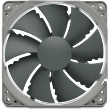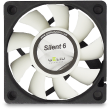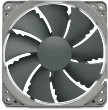Kama FLEX 80mm Case Fan, 2500 RPM Discontinued | |
| More variations available Show | |
Scythe Kama FLEX 80mm Case Fan, 2500 RPM
Scythe’s KAMA FLEX fans are equipped with genuine S-FDB (SONY Fluid Dynamic Bearing) manufactured by SONY Corporation, which drastically reduces bearing friction.
Scythe Kama FLEX - A Quality Quiet Multi-Purpose Cooling Fan
The Scythe Kama FLEX fans are equipped with genuine S-FDB (SONY Fluid Dynamic Bearing) manufactured by SONY corporation. S-FDB technology drastically eliminates the friction between the bearing and the shaft which makes this fan nearly inaudible to human ears. Additional suction magnet optimises the magnetic force balance within the rotor to achieve absolute silence. To make this fan even quieter, the fan is equipped with the Linear drive IC for reducing electromagnetic noise.
Conventional ball bearing carries a point contacting structure for the rotation, which gives point supporting situations at dropping impact to damage ball bearing surface which could cause irregular noises. The S-FDB carries a surface contact mechanism for improved anti-shock structure, which is five times stronger than a conventional ball bearing. Available in three different fan speeds, there is a solution for everybody.
Scythe Kama FLEX fans are supplied with the same S-FDB (SONY Fluid Dynamic Bearing) bearings that can be found on the extremely popular Scythe S-FLEX fans, with the only major difference being the price! This makes the Kama FLEX excellent value for money.
Features
- Quiet PC cooling fan
- Sony Fluid Dynamic Bearings
- 30.0 dB(A) / 2500 RPM / 34.0CFM
- MTBF 120,000 hours
| Specifications | Kama FLEX 80 2500 |
|---|---|
| Fan size (edge to edge) | 80 mm |
| Manufacturer | Scythe |
| Model | SA0825FDB12M |
| Air volume at full speed (12V), CFM ±10% | 34.0 |
| Noise level at full speed (12V), dB(A) | 30.0 |
| Fan speed at full speed (12V), RPM ±10% | 2500 |
| Approximate cable length, cm | 30 |
| Life expectancy @ 25°C continuous use | 120,000 hours |
| Power connector | 3-pin, 4-pin |
| Bearing type | S-FDB |
| Mounting hardware included | Screws |
| Fan depth | 25 mm |
| Rated voltage | 12 VDC |
| Warranty | 24 months |
| Specifications | Kama FLEX 80 2500 |
|---|---|
| Fan size (edge to edge) | 80 mm |
| Manufacturer | Scythe |
| Model | SA0825FDB12M |
| Air volume at full speed (12V), CFM ±10% | 34.0 |
| Noise level at full speed (12V), dB(A) | 30.0 |
| Fan speed at full speed (12V), RPM ±10% | 2500 |
| Approximate cable length, cm | 30 |
| Life expectancy @ 25°C continuous use | 120,000 hours |
| Power connector | 3-pin, 4-pin |
| Bearing type | S-FDB |
| Mounting hardware included | Screws |
| Fan depth | 25 mm |
| Rated voltage | 12 VDC |
| Warranty | 24 months |
Product Resources
FAQ
How do I measure fan size?
The size of fan you need will generally be determined by the size of the fan fitting position in your PC case. The sizes of all the fans on our website are shown as measured along any one of the fan’s four sides, NOT the distance between the fan’s screw holes! Our most popular fan size is 120mm, followed by 80mm. This isn’t really dictated by customer preference, but more by recent designs of PC cases.
As for the thickness (depth) of the fan, generally 25mm (1 inch) is by far the most common depth, although smaller fans can have shallower depths such as 15mm or even 10mm. All our fans are 25mm thick unless otherwise stated. If you have any questions about which fan you should order, please don’t hesitate to get in touch.
If you know the distance between the fan mounting screw holes but don’t know what fan size to order, please see the following table. Note that the mounting hole measurements shown below are taken horizontally or vertically between the holes and not diagonally.
Screw hole spacings and fan sizes
Space Between Screw Holes Fan Size 32mm 40mm 40mm 50mm 50mm 60mm 60mm 70mm 72mm 80mm 83mm 92mm 105mm 120mm I received a small cable (resistor) with my fan; what is it for?
The resistor cable (also called Ultra Low Noise or ULN cable) is designed to allow the fan to run slightly slower for even quieter operation. The benefit in lower running noise is significant. Although the airflow will be reduced slightly, this usually has minimal effect on PC temperature. We would generally recommend using the ULN resistor cable for best results in almost all circumstances.
How can I tell which way the air blows through the fan?
Hold the fan so that the round fan sticker is facing you. You are looking at the rear of the fan. When you plug the fan in, the air will be blowing towards you. If you want a fan to act as an air intake, then the fan sticker will be facing the inside of the case. Some fans also have two small arrows moulded into their plastic housing - one arrow shows the direction of airflow, and the other (at 90°) shows the direction of blade rotation.
Is it possible to use a 4-pin PWM fan or CPU cooler with a motherboard which has only 3-pin fan headers on it?
Electrically, there is no problem doing this - the fourth pin on the fan cable is used purely for PWM control and is not needed in order for the fan to run. So you can plug the 4-pin fan connector onto the 3-pin motherboard fan header, leaving the fourth pin not connected to anything. The fan will potentially run at full speed, so if you would like to reduce the speed of the fan you will need to adjust the fan speed setting in your BIOS or use fan control software such as SpeedFan in Windows.
The only other problem to consider is that occasionally, components immediately adjacent to the motherboard fan header can get in the way of the larger 4-pin fan connector, physically preventing connection. This problem also occurs if you try to use an in-line fan speed controller such as the one made by Gelid.
Another avenue to explore is the possibility of using a bay-mounted fan controller. Several models are available now which provide 4-pin fan headers, so this is an easy way to use 4-pin PWM fans in a PC system which has only 3-pin fan headers on its motherboards. When using this method, you may find it necessary to disable any fan warning settings in your motherboard BIOS, since the motherboard may incorrectly believe that its CPU fan has failed when the fan is connected to a fan controller rather than directly to the motherboard itself.
Top Quiet Fans

Noctua NF-P12 REDUX PWM 12V 1700RPM 120mm Quiet Case Fan

Noctua NF-A12x25 PWM chromax.black.swap 12V 2000RPM 120mm Fan

Noctua NF-R8 REDUX 12V 1200RPM 80mm Quiet Case Fan

Noctua NF-F12 iPPC PWM 12V 2000RPM 120mm High Performance Fan

Noctua NF-F12 iPPC PWM 12V 3000RPM 120mm High Performance Fan

Gelid Silent 6, 60mm Quiet Case Fan

Noctua NF-P12 REDUX PWM 12V 1300RPM 120mm Quiet Case Fan

Noctua NF-A12x25 PWM 12V 2000RPM 120mm Ultimate Quality Quiet Fan

Noctua NF-A6x25 PWM 12V 3000RPM 60x25mm Low Noise Fan

Noctua NF-A14 PWM chromax.black.swap 12V 1500RPM 140mm Fan


